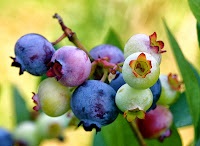Blue sky this morning, after searing pink streaks, in the season of advent. I turn on the tree every morning now for the sparkle and light in the darkness at six, and I still can't get used to darkness falling at four-thirty in the afternoon. Today I'll take my turquoise-blue tulip to church--leftover from opening-night gifts for The Language Archive--to add to the ongoing home-made advent wreath.
My church annually publishes my poem "Advent" (about this table-top "wreath," a sort of semi-circle around advent candles) in their newsletter, and I've put it in the blog before, but I'll also offer it below:
Advent
First, we bring rocks: earth curves in a bow
around the source, light. Is it miracle
or did rock bend always as the willow?
What next? Acorn, walnut, holly, bluebell
pressed with a ribbon, tuft of baby’s breath,
pine cone, lighting of the second candle
by a child. Magic again? Now our wreath
a parade of fauna: camels, a cat, a cow,
marble hippo, rocking horse. Nothing yet
prepares as well for what’s to come: our own
meager arrival as human figurines,
plaster or plastic, a fragile sturdy crowd
of admirers, rigid with unspoken awe.
We stand alive, wild at heart, hope raw.
It's a broken sonnet, with slant rhyme, and we are living in a broken world, (here in the U.S.) a broken democracy, with many things aslant. But we keep putting ourselves back together, mending, healing as best we can, grieving, and being as kind and compassionate as we are able. Some of us seem less able, alas.
Whenever I mention my church, I want to mention its progressiveness, the way it honors all faith traditions as well as none: agnosticism and atheism are honored as reasonable responses to the evidence at hand and intelligence (or intuition or instinct) within.
I finished a powerful and very intelligent book, Unsuspecting Souls, by Barry Sanders, that beautifully and terribly describes and predicts the state we are in now, placing the death of the human being in the 19th century, when science, philosophy, technology, and industry changed the world and changed the view of the "human being." Sanders understands our current fascination with zombies, the walking dead, because, as a scholar, he can trace it back to when we started walking around dead inside, absent of our former sense of being human. I can see current gun violence and terrorism through this lens. Our horror and grief and compassion in response are signs of life; our sense of it being constant and almost routine, daily, an ordinary occurrence, a testament to the inner death.
Makes me re-see my own words, though the irony was intended, and the challenge: "our own / meager arrival as human figurines, / plaster or plastic." Makes me sad, makes me turn on the Christmas tree lights in the morning, makes me wonder what I can write that will also shine a light.




I put my string of blue lights around the front door last night, my little entrance into the Christmas season.
ReplyDeleteAh, perfect, Collagemama! Blue lights in the darkness.
ReplyDeletemy soul and heart is in turmoil ('is', because i believe the two as one but just a morphing extension of each other). my heart feels the senseless coldness of those that perpetrate not just the wanton taking of life but the spreading of vitriole and hate. my soul laments in that the souls lost and those who stole them are all part of the same universal spirit. i am that soul that is resilient persists to exist, the heart that cries yet wipes the tears away but lives on...it is sad but our conversation of this 'real' issue must go on and on and on. just maybe by virtue of our perpetuating, propagating and promulgating the notion that humans need to find their souls and hearts, their humanity again will somehow make a difference.
ReplyDeletegracias for the mention ot the book. i probably will read it
have a nice day, a day of 'enough'.
Beautiful poem, Kathleen, and beautiful post. The Sanders book sounds fascinating.
ReplyDeleteThank you for pouring out your heart, Marcoantonio.
ReplyDeleteThanks, Seana! It's one of those books that puts details together in a fascinating way.
ReplyDelete